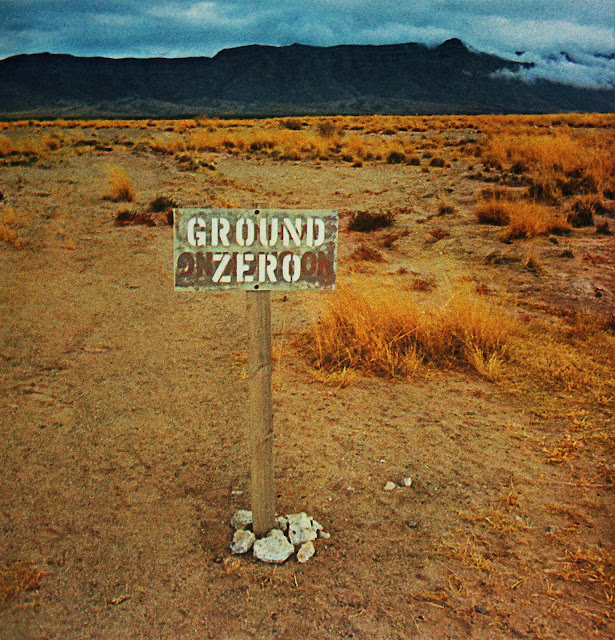From Sindh province, Pakistan, a report that the left bank of the flooding Indus River was deliberated breached, inundating a heavily-populated district and displacing millions - in order to protect the covert US terminator drone base on the right bank. So alleges writer, filmmaker and former UN Goodwill Ambassador Feryal Ali Gauhar on Democracy Now (13 September 2010).
If this can be proved or supported with compelling evidence, the staggering cynicism it exposes would, one can only hope, irreparably discredit Obama's robotic "war on terror." Who knows about this allegation? Will corporate media "investigate" a military-social disaster within a "natural disaster" that has already disappeared behind the indifference of Northern spectators? Will those who know dare to speak, after Bradley Manning and Wikileaks? Will some independent filmmaker find support for such a perilous task? Sindh province, where enforcement holds sway, is after all a very dangerous place. And the danger is objective and specific: how to make enforcement accountable (and to whom?) precisely where it operates lethally with most minimal accountability? Make a fuss? Less complicated, to take the Pentagon's word for it, move on, put it out of mind. The obstacles to reaching and broadcasting the truth belong to the essence of state terror today.
Meanwhile, amid the distraction of Islamophobic episodes, 14 antiwar activists are going on trial in Nevada for holding a nonviolent protest vigil outside Creech Air Force base, the oldest in the rapidly expanding network of bases from which Predator and Reaper drones are flown by joystick...
Meanwhile, amid the distraction of Islamophobic episodes, 14 antiwar activists are going on trial in Nevada for holding a nonviolent protest vigil outside Creech Air Force base, the oldest in the rapidly expanding network of bases from which Predator and Reaper drones are flown by joystick...
Transcript:
AMY GOODMAN: Feryal Ali Gauhar, welcome to Democracy Now! It’s interesting to go from Kathy Kelly in Nevada, who’s talking about this protest at Creech, where one of the drone programs is based, to your experience of the flooded areas in Pakistan. Can you talk about the connection?
FERYAL ALI GAUHAR: Well, yes, there is a very real connection, although that’s not the only element that we’re concerned about. But it is well known, if not acknowledged by — particularly by the state, that the base for the drones, where they’re housed before they are automated, is in Pakistan. The current government has literally gone blue in the face denying that.
But I just happened to stumble across a contractor — and that’s not the Blackwater contractor — the contractor who built the base, who inadvertently, actually, spoke about it. But he was speaking about it in a different context, and that context was the fact that he was there at the time of the flooding — and, you know, this is the worst catastrophe to have hit any state since apparently biblical times. So, he actually mentioned to me that the River Indus, which is one of the largest rivers in the world, carrying now a volume of water which has not been known in contemporary history, was breached on the left bank deliberately in order to protect the base, which is on the right bank. And the breaching caused, consequentially, the inundation of an entire district, which resulted in the displacement of millions, not thousands, but millions, because we have 170 million people in the country, and this particular district is one of the most densely populated. So, yes, there is a connect between, you know, what is considered to be a natural disaster, but then the management of that disaster is not natural at all.
FERYAL ALI GAUHAR: Oh, absolutely. In fact, it is a base where non-US military personnel are not allowed.
In fact, the person I was talking who was there, who built the base, actually said to me that one of the reasons why non-US military personnel are not allowed is not just for security of the US military personnel, but because they do not wish to share the technology. They are — you know, we’ve had a long historical and political tie with the People’s Republic of China. And so, there is this fear that was expressed while the contractor was working on the base that the drone technology, you know, should remain specifically in the hands of the US military, and it should not be replicated by any other nation. So there is that protection of the technology itself. It’s not just the protection of the personnel.
AMY GOODMAN: And this is in Sindh province?
FERYAL ALI GAUHAR: Yes, it is. Yes, in —
AMY GOODMAN: Where — and for people who are very unaware, especially in the United States, of any geography outside of our country?
FERYAL ALI GAUHAR: It’s — if you go along the River Indus, which stretches about 1,800 kilometers — and in miles, that’s about over a thousand miles—from the north to the south to the Arabian Sea. Jacobabad is named after a British colonialist, Jacob, and it is situated on the banks of the river between two provinces. The one province is Balochistan, which borders on — partly on Iran and also Afghanistan, and that is a very volatile border. And the other province is Sindh. So it is very strategically located, the base itself. Ordinary Pakistanis are not supposed to know about it. I’m sure ordinary Americans are absolutely unaware of it. But yes, there is a physical American presence.
AMY GOODMAN: We had reports that both the water was diverted, which flooded further Pakistanis, and also that the US military had to refuse to allow it to be used as a staging base for aid.
FERYAL ALI GAUHAR: Also, also true. Yes, that is also true, and which makes it even more ironic that, you know, in this so-called battle for hearts and minds — I mean, we all know that, you know, the agenda behind this very poetic sort of, you know, expression of hearts and minds, the agenda is really of violence and imperialism. And it is even more ironic that we have had many state — many visits by important personages from the United States government, including Secretary of State Hillary Clinton. And, you know, there is this desperate sort of a need to reach out to the Pakistani people. And the flood almost seems to have presented itself as an opportunity for American foreign policy to be accepted more readily by Pakistani people in exchange for relief. And, you know, relief consists of food aid, as well as shelter. But the irony is that, you know, while there is a physical military presence in the country, that is cordoned off and cannot be used for humanitarian purposes.
So American forces and helicopters have actually been flying in from the Seventh Fleet into Pakistan and from other locations, possibly even from Afghanistan, because in 2005 during the colossal earthquake, which cost us 75,000 lives, we did have a diversion of the particular kinds of helicopters, which are the large—I think they’re called the Chinook, which was diverted from Afghanistan, from the duties there, which, again, is ironic — I mean, I just find things all connected — which is again ironic because at the time of Hurricane Katrina, the National Guard, who was supposed to have been protecting the American people, the National Guard was engaged in Afghanistan at that time, or in Iraq, one of the two countries. So, you know, you have this ongoing irony, series of ironies, where the state is meant to protect the people; it’s actually protecting only its own interests at the expense of the people.
AMY GOODMAN: You were in Pakistan, and you are Pakistani, but you were in Pakistan with Palestinian doctors helping flood victims?
FERYAL ALI GAUHAR: Yes, I was. I mean, for us, it was very — it was a symbolic presence, a very significant symbolic presence. The Pakistani people have been friends and supporters of the Palestinian liberation movement and the movement for self-determination of a sovereign people. And it was a very small team, six—four doctors and two medical technicians. And I felt that, of the foreign missions that had come — and there have been many, many, many — I have had a long association with the Palestinian movement, and I felt that this was my way of reconnecting with that movement. And my experience, of course, with the flood affectees was something else, which we can talk about if you like. But in personal terms, it was something I never expected, is that, as a result of my association with the team, I was then offered — and, in fact, given—the honorary citizenship of Palestine, which, for me, as a Pakistani, you know, is like—is like, for a lot of people, getting the green card to come and live in the United States. So I have had both a personal fulfillment and a political fulfillment in this experience.
AMY GOODMAN: Well, I want to thank you very much for being with us, Feryal Ali Gauhar, a Pakistani filmmaker, writer, actress, human rights activist, served as a Goodwill Ambassador for the UN, the only Goodwill Ambassador to have quit over the US invasion of Iraq. She has written a novel about Afghanistan. It’s called No Space for Further Burials.
Video stream of the interview is online at Democracy Now.
Video stream of the interview is online at Democracy Now.









No comments:
Post a Comment